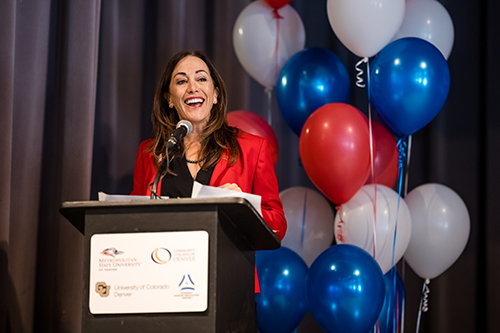Request Information
Ready to find out what MSU Denver can do for you? We’ve got you covered.
March 8, 2022

Happy International Women’s Day! For over 100 years, March 8 has been marked around the world as a day of solidarity among women. Rallies, protests and conferences have been held to celebrate progress while also highlighting remaining inequality and injustice facing women around the world. Although the status of women has improved measurably over the past century, many barriers and inequities remain today – and in some cases have been exacerbated by the global pandemic. Higher education has played a key role in improving the lives of women and will continue to be essential as we confront the post-pandemic world.
The first co-educational colleges opened in 1835 in the United States, largely driven by the need to educate teachers. By the end of the 19th century, nearly one-third of college students were women, seeding a movement challenging gender roles in the early 20th century. The pioneering female students on our college campuses broadened possibilities for young women and helped set a new course for our country.
Today, women are more likely to enroll in and complete college than men. Around 60% of college students in the U.S. are women – more than 11 million students. At Metropolitan State University of Denver, we educate 56% female undergraduates and 78% female graduate students. Women are also well-represented in leadership on the Auraria Campus, which is home to two universities including MSU Denver, a community college and a shared operational unit: All four entities are led by female executives.
Unfortunately, the boom of women going to college has not transformed the American workforce to the same extent. A strong gender pay gap persists, which is doubly problematic considering that women hold the majority of student loan debt in the U.S. Men with bachelor’s degrees make $26,000 more annually than female colleagues, while women owe an estimated two-thirds of student loan debt.
Part of the problem is that women are underrepresented in high-paying C-suites and in “jobs of tomorrow” such as cloud computing, engineering or artificial intelligence – fields powered by STEM education. Research shows the lack of female representation in emerging jobs is not necessarily a supply problem but a symptom of wider bias pushing women out of STEM jobs.
Higher education isn’t immune to the wage gap, either. In the U.S., 43% of tenure-track faculty are women, compared to 54% female professors on the less lucrative non-tenure track.
On top of these longstanding issues, the recession caused by Covid-19 – often dubbed the ”she-cession” – has disproportionately displaced women, who were 3-4 times more likely than men to reduce their work hours or leave the workforce altogether.
Derailing the careers of women who already earn less and have more student debt will have far-reaching consequences, not just for women but for the American economy and society. Thankfully, there are women charting a course to improve conditions for women in the workforce, and not just a return to pre-pandemic conditions.
A report authored by two women at MSU Denver earlier this year – Human Services Chair Annie Butler, Ph.D., and graduate student Cate Hill – outlines many of these challenges facing working women in 2022, as well as suggestions for employers to support, attract and train female workers. “The Great Reset,” commissioned by the Colorado Women’s Chamber of Commerce and TARRA, covers topics such as certification badges, intentional lending practices, equitable salary/benefits, childcare considerations, health care, hiring practices, mentoring/networking and more.
MSU Denver is also looking for ways that we can deliver flexible education options to get women back in the game, including scholarships and career coaching through our Displaced Worker Grant and Finish What You Started initiatives for those with some college credit but no degree who want to complete their credentials.
Women have found their place in higher ed, but there is still a lot of work to do beyond that, including representation at higher levels of corporations, legislative bodies and particularly in key STEM fields. The social experience of a STEM education and the gendered signals, conscious or unconscious, that may accompany that go a long way toward shaping our future.
Women in the workforce will be key to America’s short-term recovery and long-term economic growth. History shows us not only how important access to higher education is in driving individual social mobility, but also in driving innovation and broadening societal perspectives and therefore possibilities. Women’s History Month is a great time to honor those who have broken barriers and made our world a better place, and it’s also a critical time to confront the barriers facing the women who are building our tomorrow.
On this International Women’s Day, please join me in helping #BreakTheBias by learning more about how to identify and combat bias against women.
Sincerely,
Janine Davidson, Ph.D.
President, MSU Denver